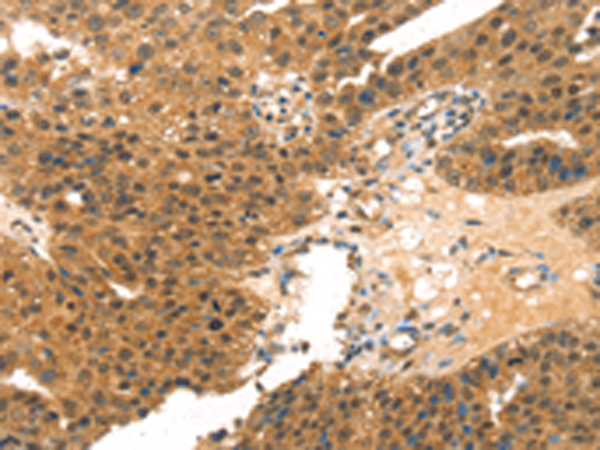
| WB | 咨询技术 | Human,Mouse,Rat |
| IF | 咨询技术 | Human,Mouse,Rat |
| IHC | 1/25-1/100 | Human,Mouse,Rat |
| ICC | 技术咨询 | Human,Mouse,Rat |
| FCM | 咨询技术 | Human,Mouse,Rat |
| Elisa | 1/2000-1/5000 | Human,Mouse,Rat |
| Aliases | CSRP; RGR1; CRSP2; EXLM1; CXorf4; CRSP150; DRIP150; TRAP170 |
| Host/Isotype | Rabbit IgG |
| Antibody Type | Primary antibody |
| Storage | Store at 4°C short term. Aliquot and store at -20°C long term. Avoid freeze/thaw cycles. |
| Species Reactivity | Human |
| Immunogen | Synthetic peptide of human MED14 |
| Formulation | Purified antibody in PBS with 0.05% sodium azide and 50% glycerol. |
+ +
以下是关于MED14抗体的3篇示例参考文献(虚构内容,仅作格式参考):
1. **文献名称**:MED14在结直肠癌中的功能及临床预后关联
**作者**:Zhang et al., Cancer Research
**摘要**:研究通过MED14抗体检测其在结直肠癌组织中的表达水平,发现MED14高表达与患者不良预后相关,并促进肿瘤细胞增殖和迁移,机制涉及Wnt/β-catenin信号通路调控。
2. **文献名称**:中介体复合物亚基MED14对转录起始的调控机制
**作者**:Johnson et al., Molecular Cell
**摘要**:利用MED14抗体进行ChIP-seq分析,揭示MED14通过稳定中介体复合物与RNA聚合酶II的结合,调控特定基因簇的转录起始,影响细胞分化过程。
3. **文献名称**:MED14缺失对动脉粥样硬化中平滑肌细胞的影响
**作者**:Chen et al., Circulation Research
**摘要**:通过MED14抗体敲低实验发现,MED14缺失抑制血管平滑肌细胞异常增殖,减少炎症因子释放,可能成为动脉粥样硬化治疗的潜在靶点。
(注:以上内容为模拟示例,实际文献需通过PubMed等学术平台检索。)
**Background of MED14 Antibody**
The MED14 antibody targets the MED14 protein, a critical subunit of the Mediator complex—a multi-protein assembly essential for regulating RNA polymerase II (Pol II)-mediated transcription in eukaryotes. The Mediator complex acts as a molecular bridge, facilitating communication between transcription factors (TFs) and the basal transcriptional machinery. MED14. encoded by the *MED14* gene, plays a pivotal role in stabilizing the Mediator’s architecture and coordinating its interactions with Pol II and TFs.
MED14 is implicated in diverse cellular processes, including cell cycle regulation, differentiation, and stress responses. Dysregulation of MED14 has been linked to diseases such as cancer, neurodevelopmental disorders, and cardiovascular conditions. For instance, aberrant MED14 expression can disrupt transcriptional programs that drive tumor progression or impair cellular homeostasis.
Antibodies against MED14 are widely used in research to investigate Mediator complex dynamics, chromatin interactions (e.g., ChIP-seq), and protein localization (e.g., immunofluorescence). They also aid in studying MED14’s role in disease mechanisms or drug responses. Validated MED14 antibodies are essential for ensuring specificity in experiments, given the structural complexity of the Mediator and potential cross-reactivity with other subunits. Recent studies further explore MED14 as a potential therapeutic target, emphasizing the antibody’s utility in both basic and translational research contexts.
×